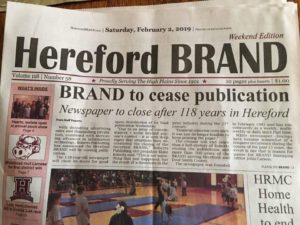It’s no secret that newspapers are cutting staff to maintain their profitability in the face of the changing media climate that has produced declining circulation and advertising revenue.
The Amarillo Globe-News in Texas is no exception — quite obviously! — to that trend. The G-N, indeed, managed to eliminate its entire photo staff over time, instructing the reporters it has left on staff to shoot their own pictures while covering events.
Well, guess what! That isn’t a new notion for some of us who got their start in small-town newspapering back in the day.
My reporting career began full-time in the spring of 1977. I got hired at the Oregon City (Ore.) Enterprise-Courier as a temporary sports writer; the sports editor, one of the very few women in the business, had taken maternity leave to give birth to her daughter. The editor of the paper needed someone to fill in. I applied; he hired me; then a position opened up on the news staff and I was allowed to stay after the sports editor returned from her leave.
Part of my job was to take pictures along with reporting on events I was covering. Football games? Basketball games? Wrestling matches? I packed my notebook and pen — and a camera! Then I became a general assignment news reporter, so I took my camera to city council, school board and county commission meetings. I had to take what we called “wild art” photos we would publish without a story accompanying them.
I knew how to report on those events and how to write about them in cogent manner. Photography was a brand new concept. I had to learn about “photo composition” and how to eliminated “dead space” in pictures.
That was just part of it. I also had to learn how to develop those pictures. Yes, we had dark rooms back then. They had basins filled with smelly chemicals into which we had to dump our film. Then we had to dry the film on lines strung across the dark room. Once the negatives were dry, we then had to print what we called “contact sheets,” which were “positive” reproductions of the images on the “negatives.”
Yes, those were days when reporting and writing also include plenty of picture-taking. We were well-rounded back then, just as reporters today are being asked to become more well-rounded now.
I hope the kids today have as much fun as I did back in the journalism “stone age.”







